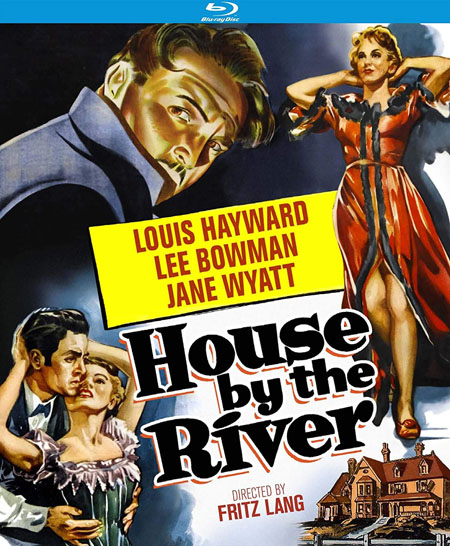
“KILLER
WRITERâ€
By
Raymond Benson
The
likely apocryphal story Fritz Lang told folks was that in 1933, after enjoying a
successful career with German silent films and a couple of talkies, he was
invited to a meeting with Joseph Goebbels. The job offer was to be in charge of
the Nazis’ propaganda filmmaking. Lang, a Jew, nodded enthusiastically, went
straight to the train station without going home to pack a bag, and fled the
country. He left behind his wife (who was a member of the Nazi party), spent
some time in France, and then came to Hollywood. The rest, as they say, is
history.
Lang
worked in all genres but specialized in crime pictures (some of the best examples
of film noir). Most of his work in any of the genres are dark,
pessimistic, and have a bite. His 1950 noir, House by the River, which
was based on a novel by A. P. Herbert and adapted to the screen by Mel Dinelli,
fits into this mold. While not a huge box office or critical success, House manages
to be an atmospheric, entertaining murder tale despite its predictability.
We
know from the beginning who the killer is. Stephen Byrne (Louis Hayward) is a
successful novelist who resides with his wife Marjorie (Jane Wyatt) and a hot new
live-in maid, Emily (Dorothy Patrick). Stephen’s handicapped brother, John (Lee
Bowman), lives nearby and is a frequent visitor. In fact, the Byrne marriage is
not in a great place, and John and Marjorie harbor feelings for each other.
Stephen, unfortunately, becomes a deranged lunatic when he drinks, and one
night when Marjorie is away, he assaults Emily and ends up strangling her.
Stephen convinces John, who loves his madman brother anyway, to help him
dispose of the body in the river that flows by the house. Of course, the body
eventually floats up, is discovered by the police, and there are clues that
point to… John. The story then becomes one of not whodunnit, but will-the-right-guy-get-arrested?
The
three leads are very good, even though Hayward’s crazy-writer act is over the
top—but it somehow works within the style of the piece and with Lang’s
direction.
Kino
Lorber’s new Blu-ray restoration looks fine, bringing out an unusual black and
white soft focus (the cinematography is by Edward J. Cronjager) that helps
establish the moody milieu. The supplements are an audio commentary by film
historian Alexandra Heller-Nicholas, and an interview with producer and
historian Pierre Rissient. Theatrical trailers for this and other Kino Lorber
titles are included.
House
by the River is
an intriguing character study, and also perhaps a warning to authors out there
that it’s not always a good thing to “write what you know.â€
CLICK HERE TO ORDER FROM AMAZON